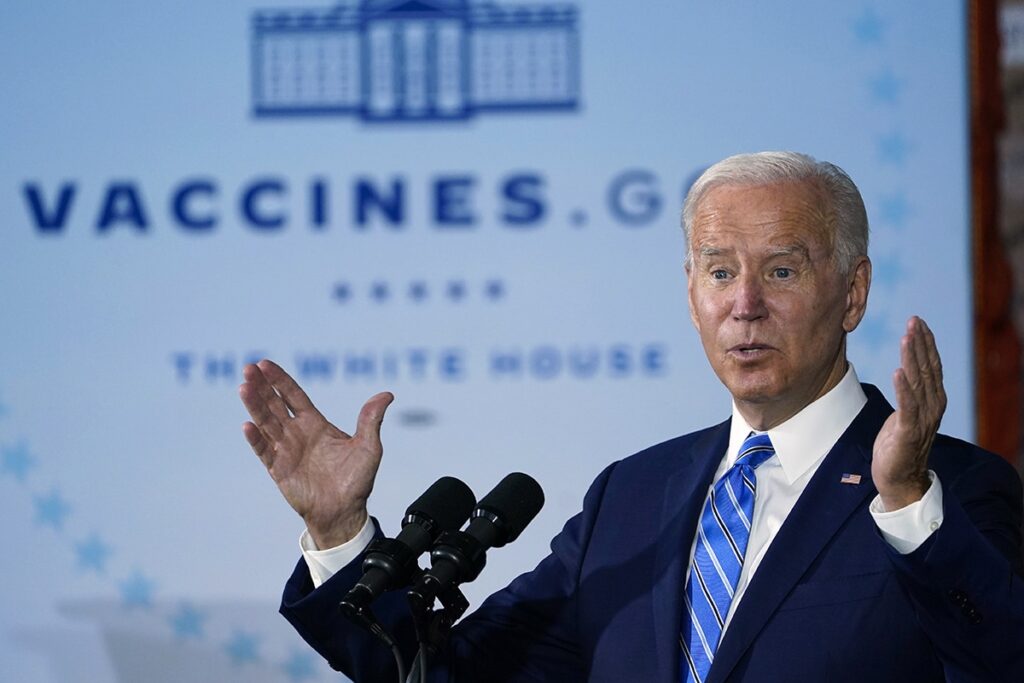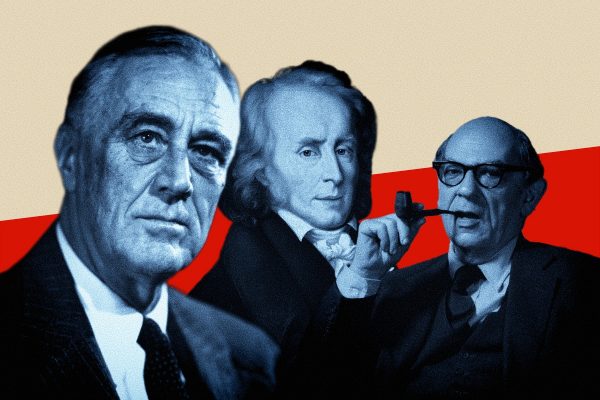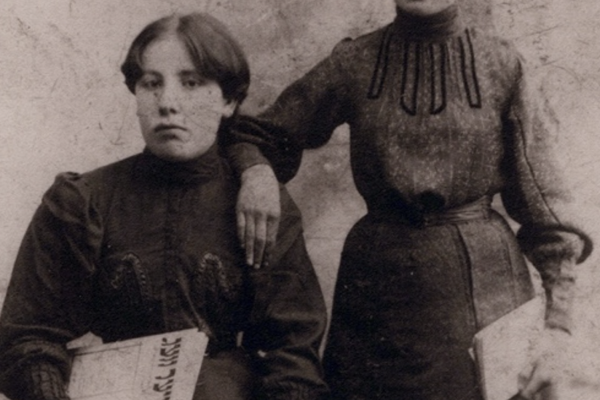In declining to lift a stay on President Joe Biden’s vaccine mandate on November 12, the judges on the U.S. Court of Appeals for the Fifth Circuit declared that “the Mandate is a one-size-fits-all sledgehammer” that takes away Americans’ ability to make what the judges called “intensely personal decisions.”
This was far from the first time this year the phrase “one size fits all” has been used as a cudgel against government-mandated public goods and programs. In February 2021, for example, Senator Joni Ernst (R-IA) argued against Biden’s proposed $15 hourly minimum wage by declaring, “We should not have a one-size-fits-all policy set by Washington politicians.”
But uses of the phrase have a longer history dating back to 1980s critiques of public goods. In particular, over the last few decades, “one size fits all” has become a cliché political talking point, a conservative rhetorical flourish meant to put the kibosh on any and all government social welfare policies.
In our current moment, however, the “one-size-fits-all” charge is confusing, if not incoherent. After all, if they are to prevent the worsening of a deadly epidemic, public health measures must apply to everyone. To call a vaccine mandate a constraint on an “intensely personal decision” is to obfuscate the fundamental reality that pandemics are intensely social.
Moreover, what Senator Ernst calls a “policy set by Washington politicians” is, by its proper name, a federal law, the making of which is the primary job of our legislators. To gain legitimacy, laws are generally expected to “fit all.” Everyone who exceeds the speed limit can expect to be fined. In his “Letter from Birmingham Jail,” Martin Luther King, Jr., described “just law” as “a code that a majority compels a minority to follow, and that it is willing to follow itself.” He called this principle “sameness made legal,” which sounds quite a lot like “one size fits all.”
Before it became an epithet, “one size fits all” appeared in advertising as a symbol of U.S. technological ingenuity. The age of mass production saw the innovation of new stretchable materials, which became integral to garments such as the one-size-fits-all “kimono-style robes of polyester-acetate-nylon velour” advertised by Bradlees department store in 1985. Companies sold a wide range of products—hats, gloves, robes, “motor seats covers,” “bath kilts,” and so on—that they proudly advertised to customers as “one size fits all.” This flexibility was something to be celebrated, as in a 1937 ad for a women’s bathing suit made of “two-way stretch latex” that “fits all figures from 12 to 20.”
Perhaps not coincidentally, the period when ad men celebrated “one size fits all” as a consumer ideal in the private economy was also the era of the “New Deal Order” (from the election of Franklin D. Roosevelt in 1932 through the 1970s), during which the country showed its greatest commitment to broadly distributed public goods, including electricity, dams, parks, and government buildings as well as publicly funded theater, music, dance, and state guides and histories, such as the WPA Slave Narratives.
In his second inaugural address, FDR celebrated government as an institution that “has innate capacity to protect its people against disasters once considered inevitable, to solve problems once considered unsolvable.” For decades after he died in 1945, the federal government showed itself to be capable of promoting the general welfare not only via programs such as Social Security, Medicare, and Medicaid and through ambitious infrastructure programs (such as the Federal Aid Highway Act of 1956), but in its promotion of civil and voting rights, which, for the first time since Reconstruction, made the United States a true democracy in which all adult citizens had “one-size-fits-all” rights.
But as the New Deal order waned, a new ethic emerged that privileged individual choice, denigrated society, denounced public spending, and critiqued the government as sclerotic and increasingly incapable of serving citizens—now often figured as “customers,” “taxpayers,” or “entrepreneurs.” In the process, “one size fits all” migrated from a selling point of modern fabrics to a derogatory term connoting the straitjacket of the autocratic, bureaucratic welfare state. It entered into our political language just as the reigning paradigms of economics (mass production/consumption) and politics (New Dealism) were sputtering. If the phrase signified expansiveness in marketing, it came to stand for constraint in politics. The changing valence of the phrase marks a political transformation with which we are still wrestling.
Looking back on these transformations in 1996, Herbert London, president of conservative think tank the Hudson Institute, made these connections between economics and politics explicit. He argued that as the United States moved into an economic “era of customization,” the political economy of “mass production has faded into obscurity.” London claimed that there was a political corollary to this economic change: “Is it any wonder, then, that national politics in which one size fits all is in desuetude.” He argued that, after rising to the occasion to win World War II and the Cold War, Americans had become “wary of national goals.” In this post–New Deal era, “most people believe that they are best served by tending to their own gardens” and they could return to their roots as “rugged individualist made more rugged by the advances in technology.”
But what London celebrated as innovation could also be read as retrogression, an undermining, even a denial, of the necessity of a robust public sphere.
An early adapter of “one size fits all” as a political critique was Ed Clark, the 1980 Libertarian Party presidential candidate. (His vice-presidential nominee was David Koch, one of the infamous Koch brothers.) In a profile, reporter Carl Wernicke noted that Clark “blames the decline of public education on government trying to fit a wildly diverse population into an educational straitjacket, one size fits all.”
But the phrase really took off in the 1990s as a way to oppose progressive policies. For example, in February 1990 conservative columnist James J. Kilpatrick wrote, in opposition to so-called “motor voter” laws, “A decent respect for federalism would not impose one-size-fits-all on the states, but would rather encourage experiments in an effort to determine what works.” A few months later, in May, Kilpatrick employed much the same language to justify his opposition to a proposed family and medical leave bill being considered by Congress: “The cost to employers is the least of the objections to the bill. A much greater objection is the nature of the benefit. It is one-size-fits-all.”
Kilpatrick’s precise objection to easier voter registration and improved worker leave is never spelled out. The invocation of a “one-size-fits-all” bogeyman replaces argument. And from then on, that is how “one size fits all” has nearly always been employed, as a substitute for persuasion.
When President George H. W. Bush vetoed the Family and Medical Leave Act in July 1990, he used much the same language of choice and consumer preference: “By substituting a ‘one size fits all’ government mandate for innovative individual agreements, this bill ignores the differing family needs and preferences of employees and unduly limits the role of labor-management negotiations.” During the remainder of his presidency, Bush employed the phrase regularly and, over time, he made it an increasingly explicit symbol of the repudiation of liberal philosophies of government that predominated during the New Deal era. In a 1992 statement written in response to the uprising following the acquittal of all four officers for assault for their beating of Rodney King, Bush claimed, “Detailed one-size-fits-all ‘solutions’ created in the 1960s obviously can’t cope with the challenges of the 1990s.”
Bush’s surrogates used the slogan as their justification for opposing all manner of progressive political goals. In 1990 Elizabeth Dole, Bush’s labor secretary, said, “Child care options should be increased and not limited through a one-size-fits all government mandate.” In 1992 Michael R. Deland, chair of the president’s Council on Environmental Quality, called into question the environmental goals set by the UN Earth Summit, which he denounced as “one-size-fits-all targets.”
In his campaign against the Democratic candidate, Bill Clinton, Bush used the expression to characterize the stakes of their political differences. Just before Election Day in 1992, he said, “My opponent’s plans says government knows better and government will mandate a solution where one size fits all.” In contrast, Bush said, he wanted decision-making to be “in the hands of individuals, not government.”
Over the course of the 1990s, the language of “one size fits all” became a generic putdown for all manner of progressive policies. Building on this popularized use, GOP political platforms from 1992 through 2016 regularly denounced “one-size-fits-all” approaches. For example, the 1992 platform asserted, in the “Caring for Children” section, that such an approach “puts mandates on employers and takes choice away from employees.” In the 1996 platform, the party proclaimed, in sections on homeownership and speed limits, “Washington must abandon the ‘one-size-fits-all’ approach.” The 2000 platform’s section on Medicare called for “no more governmental one-size-fits-all” programs. In later years, this slogan appeared in the Republican platforms to criticize Democratic educational and financial policy as well.
As much as the slogan was used to target Democratic policies, many Democrats, for their part, adopted it as well—for example, for intra-party critiques of Clinton’s presidency. In this sense, the slogan is a perfect specimen of what has come to be called the era of neoliberalism, a period during which, across the political spectrum, political leaders and pundits have celebrated the individualistic ideology of the market at the expense of social welfare spending while valorizing “choice” as both the goal of politics and the essence of citizenship.
The slogan particularly appealed to centrist Democrats associated with the Progressive Policy Institute. In facing up to the fact that their party had won only one presidential election since 1964 (and that was the anomalous 1976 post-Watergate election that brought outsider Jimmy Carter to power), they argued that Democrats could only retake the executive branch by first eschewing their image as the party of big government. Will Marshall, the institute’s president, claimed in March 1992 that “the old ideologies are obsolete” when it comes to “thinking about what’s wrong with government,” the implicit message being that, as Ronald Reagan had famously claimed in his First Inaugural Address in 1981, “government is not the solution to our problem; government is the problem.”
In May 1992, Elaine C. Kamarck, a founder in the 1980s of the “New Democratic” movement and a senior fellow at Progressive Policy Institute, wrote that Clinton, the likely Democratic nominee, “needs to convince America that he is not an old-fashioned tax-and-spend liberal.” To do this, “he has to explain how he proposes to offer activist government without the stifling bureaucracy and high taxes that Americans associate with Democrats.” This was a call for Democrats to move beyond the New Deal/Great Society governing vision that prized public goods, which was now being presented as not only outdated but antithetical to freedom.
A key text putting forward this innovative view was David Osborne and Ted Gaebler’s 1992 book Reinventing Government: How the Entrepreneurial Spirit is Transforming the Public Sector, which was praised by Clinton, who later brought Osborne into his administration as a senior advisor to Vice President Al Gore’s “reinventing government” initiative. Osbourne and Gaebler employed the phrase “one size fits all” four times in the book and said that government had to operate in a world of “niche markets, in which customers have become accustomed to high quality and extensive choice.” They wrote that entrepreneurial governments “redefine their clients as customers” and put “customers in the driver’s seat.” In a world in which “even department stores have begun to customize their services for the individual, bureaucratic, unresponsive, one-size fits all government cannot last.” A new kind of nimble government needed to provide “handcraft solutions rather than create one-size-fits-all programs,” they asserted. Throughout, Osborne and Gaebler emphasized the need for government to provide choice rather than mandates in education, health care, and many other areas.
Osborne contended that reinventing government was “not a liberal or conservative issue.” But the underpinning belief was that government should learn from business and that, as Alan Ehrenhalt, executive editor of Governing magazine, said in 1992, it was unrealistic to expect that contemporary social problems “could be solved in much the same way as the interstate highway system was built.” The push was thus toward a suspicion of faith in government and public goods—that is, in a conservative direction. What Ehrenhalt called a “foolish overconfidence of the Great Society” bore a striking resemblance to President Bush’s dismissal that same year of the relevance of “‘solutions’ created in the 1960s.”
As president, Clinton tried to revive faith in government, but he did so within the narrow parameters set by the “one-size-fits-all” discourse, which cast suspicion on broad social welfare policies. Echoing his 1996 State of the Union address, Clinton wrote in his status report to Congress later that year, “the era of big, centralized, one-size-fits-all government is over.” In response, the Associated Press not inaccurately observed that Clinton’s language expressed “Republican themes.”
Anticipating and seeking to cut off this reading of his politics, Clinton said in the very next sentence of his address, “we cannot go back to the time when our citizens were left to fend for themselves.” And his presidency had a number of progressive accomplishments, including a tax increase on the wealthy, the Children’s Health Insurance Program (CHIP), and an expansion of the Earned Income Tax Credit.
But the Democratic attempt at political jujitsu had limited success. Clinton’s rhetoric modified but did not rewrite the dominant Reaganite script that all government spending not connected to Defense was suspect. And notwithstanding Clinton’s own critique of “one-size-fits-all” policies, the language was still deployed against his signature health care proposal, the Health Security Act of 1993, which ultimately failed. As political sociologist Paul Starr wrote, Clinton’s expectation that “market-oriented, consumer-choice approach to universal coverage, positioned in the center, could become a platform for consensus” did not win the day. Typical was the complaint of Florida Republican senator Connie Mack about its “Washington-mandated, one-size-fits-all approach”—precisely the kind of criticism Clinton had sought to preempt. “A fundamental right of each American is the right to make choices for yourself,” Mack inveighed. “You know more about yourself than some bureaucrat.” The Senate GOP policy committee echoed Mack in 1994, claiming that “the real crisis in health care is the one President Clinton’s one-size-fits-all plan would create.”
Fifteen years later, Republicans used much the same language against President Barack Obama’s Affordable Care Act. After it became law in 2010, they continued to employ the “one-size-fits-all” slogan in their frequent, if ineffectual, efforts to “repeal and replace” Obamacare. After the 2015 Supreme Court King v. Burwell decision upheld the law, Rick Perry, former Texas governor and GOP presidential hopeful, called it “a heavy-handed, one-size-fits-all policy” that “does nothing to help health outcomes for Americans.”
And the same language has now been used to condemn President Biden’s Build Back Better. That agenda, quite popular in public opinion polls, represents a return to New Deal traditions and marks something of a break for Democrats, several years in the making, from being beholden to the neoliberal bugbear of “one size fits all.”
“One-size-fits-all” formulations are not always or inherently just. Especially in criminal justice—think “Three strikes” laws or mandatory minimum sentences—they can act as inflexible impositions and barriers to justice. Yet this is more a function of the truth that laws can be poorly designed or discriminatory, not that universal laws are inherently immoral. Indeed, part of what makes these laws problematic is that they do not in fact apply to all; they are the sort of unjust laws King described, in his “Letter from Birmingham Jail,” as ones the “majority group compels a minority group to obey but does not make binding on itself.” As long as “one-size-fits-all” policies provide a floor (say, a $15 an hour minimum wage) and not a ceiling (i.e., all workers are paid only that minimum), they fit King’s definition of just laws.
Yet the conservative objection to “one size fits all” focuses not on the discriminatory potential of such laws but on universal social programs. Moreover, those who employ the phrase to denounce such policies embrace it in other contexts. Many Republican legislators and governors embrace bureaucracy and one-size-fits-all solutions when they pronounce what educators can and cannot teach, tell businesses how to operate, and dictate reproductive health decisions for women.
Beyond the issue of hypocrisy, there is the more fundamental concern about how the one-size-fits-all talking point now seeks to constrain something as basic to the functioning of a democracy as the ability to protect the health of its citizens.
These days, one-size-fits-all critiques typically betray a misunderstanding of what public goods are and how they enable people to thrive. A strong program of government-backed health insurance does not mean that someone who goes to the doctor with a kidney ailment will be forced to undergo knee surgery. It means that everyone has insurance and will be treated according to their particular malady. Similarly, a vaccine mandate gives people the freedom to go about their business and to participate in the public sphere. Public goods, like health care, accommodate for the uniqueness of each individual and allow them—and the polity they comprise—to flourish.
Unmasking “one-size-fits-all” critiques can help make the case for universal public goods that will allow every citizen—supported by public goods such as child care, paid leave, free pre-K, and health care—to thrive in their own unique way.








